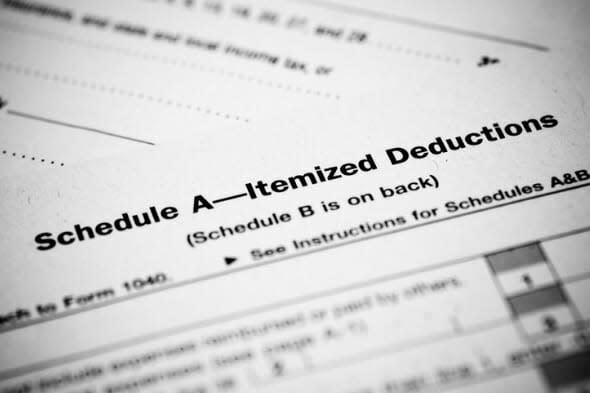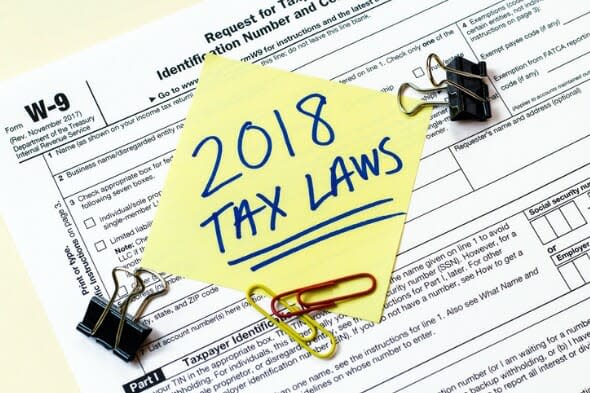Who Should Itemize Under the New Tax Plan

When you file your federal income taxes, you have the choice between taking the standard deduction and itemizing your deductions. Which you choose should depend on which strategy will maximize your tax benefits. Your calculations may also have changed recently because of the new tax plan passed by President Trump and Congressional Republicans. Here’s a look at who should itemize under the new tax plan.
What It Means to Itemize Deductions
There are two options for how you can deduct your expenses when you file your federal income tax return. Taking the standard deduction is the simplest option. It allows you to deduct a set amount of money from your taxes. The other option is to itemize. Itemizing allows you to list your expenses and then deduct the total of everything you’ve listed. If your expenses throughout the year were more than the value of the standard deduction, itemizing if a useful strategy to maximize your tax benefits.
Keep in mind that not all expenses qualify when you itemize. If you aren’t familiar with which expenses you can deduct, you may want to read a guide to itemized deductions. In brief, things you can deduct include
Medical and dental expenses
Certain taxes, including sales taxes and property taxes
Mortgage loan points
Mortgage loan interest
Investment interest
Charitable donations
Tax preparation fees
Unreimbursed employee expenses
Business expenses, including some for travel
Work-related education expenses
Casualty, disaster and theft losses
Why the New Tax Plan Makes a Difference for Itemizers

In Dec. 2017, President Trump signed a new tax plan into law. One part of this tax plan was increasing the standard deduction. For single filers, the deduction for the 2018 tax year is $12,000. That’s nearly double the 2017 value of $6,350. For married taxpayers filing jointly, the standard deduction for the 2018 tax year is increasing to $24,000 from $12,700.
Because of the higher standard deduction, fewer people will benefit from itemizing. Let’s say you’re a single filer with $10,000 worth of deductions if you itemize. On your 2017 tax return, this would save you almost $4,000 more than taking the standard deduction. However, it wouldn’t save you anything on your 2018 taxes because the standard deduction is higher.
Who Should Itemize
To decide whether itemizing is worth it, you will need to do some math. Add up all the expenses you wish to itemize. If the value of expenses that you can deduct is more than the standard deduction ($12,000 for 2018) then you should consider itemizing.
Another big consideration is that itemizing will require a bit more work. Itemizing requires you to keep receipts from throughout the year. You should also need to keep those receipts after you file just in case the IRA decides to audit you. (Don’t forget that the IRS may audit a return from as long as six years ago.) On the other hand, if you take the standard deduction, there is no extra math and you don’t need to keep any receipts.
For most people, there is a balance between the work required to itemize and the amount you save by itemizing. For example, let’s say you want to itemize. You add up all your expenses and find that you would save $500 by itemizing. It’s probably worth doing a little extra work to get $500. What is you add up your expenses and see that itemizing would only save you $100? That $100 may still be worth it for some, but for others, it may just be easier to take the standard deduction and not worry about keeping track of your receipts.
The Bottom Line

Generally speaking, itemizing is a good idea if the value of your itemized expenses is more than the value of the standard deduction. Because the new tax plan nearly doubled the standard deduction for the 2018 tax year, some people who itemized their 2017 taxes will not benefit from itemizing their 2018 taxes. And even if itemizing would save you more than standard deduction, consider the amount of time and energy that also goes with itemizing. The biggest example of that would be keeping track of your receipts and expenses throughout the year. You should also keep your receipts for seven or more years after you file your taxes (in case of audit).
Tips to Get You Through Tax Season
Keeping all of your tax documents organized will help you ace your tax filing. If you choose to itemize, staying organized includes keeping all your receipts. You should keep receipts for at least a few years after you file. It isn’t uncommon for the IRS to also look at returns from three to six years prior to the return they are actually auditing. And depending on which deductions you take, like the home office deduction, your return is more likely to trigger an audit.
If you’re confused by taxes and you need help navigating tax season, consider working with a tax accountant. They are experts in the tax code and will help you maximize tax benefits. Another option is to work with a financial advisor. A financial advisor has the advantage of being able to help you handle all of your finances throughout the year, while also keeping an eye on your tax obligations. (So if you need help getting your retirement savings on track, consider investing in a retirement account through a financial advisor.)
When you file your taxes, there are quite a few tax filing services to choose from. Two of the most popular, H&R Block and TurboTax both offer a user-friendly design with good explanations of the filing process. Here’s a breakdown to help you decide which service may be better for you.
Photo Credits: ©iStock.com/emmgunn, ©iStock.com/Enterline Design Services LLC, ©iStock.com/PeopleImages
The post Who Should Itemize Under the New Tax Plan appeared first on SmartAsset Blog.
